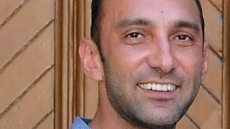VANCOUVER — A British Columbia man says his son was in a "fragmented" state of mind just days before he hanged himself in a solitary confinement prison cell where he didn't belong.
Robert Roy told a B.C. Supreme Court trial challenging the use of indefinite confinement that he was distressed to learn his son wanted to be transferred from medium-security Matsqui Institution in Abbotsford to Kent Institution, a maximum-security penitentiary in nearby Agassiz.
Court heard Christopher Roy, 37, arrived at Matsqui and was immediately placed in a segregation cell, where he used a ligature to kill himself two months later in June 2015.
His father testified Wednesday that he learned from Correctional Service Canada documents he obtained through a freedom of information request that his son was placed in isolation because there was nowhere else to put him.
Roy said his son hanged himself just hours after being told he'd be sent to Kent Institution, adding he was surprised to learn his son told a parole officer he wanted to be moved to a maximum-security facility.
"I believe my son was not in a healthy state of mind at that point," Roy said at a trial launched by the B.C. Civil Liberties Association and the John Howard Society of Canada. The groups allege the country's solitary confinement regime constitutes cruel and inhumane treatment.
Matthew Huculak, a lawyer for the federal government, said Roy believed other inmates at Matsqui were incompatible with him and that was also the case with other medium-security prison in the Pacific region.
Roy said his son never mentioned anything to him about any so-called incompatible inmates, or inmates that were a risk to his safety.
He said in his affidavit dated June 20 that he made freedom of information requests in August 2015 in an effort to shed light on the circumstances surrounding his son's suicide.
Roy said he learned that the two people who had completed psychiatric assessments of his son, including to determine whether he was suicidal, were not registered psychologists.
"I was heartbroken to learn further about what my son's life in segregation was like," he said, referring to photos of a cell and testimony he heard at a coroner's inquest last July.
"Chris was in his cell 23 hours a day, with one hour out for showering and the like as well as for time in a yard, which I came to understand was a small area with an opening for fresh air and which Chris could walk around during his one hour out," he said in the affidavit.
"One of the hardest things I have ever had to do even with seeing my son pass away was try to explain to his kids why their dad is gone, and I only know that as they get older they are going to have more questions as to why their father died, and why it was at his own hand," Roy said.
Roy said his son's death was entirely preventable, if only he had not been placed in isolation.
The plaintiffs in the case say mentally ill and Aboriginal prisoners are placed in segregation for longer periods of time, sometimes for years, worsening their physical and psychological conditions.
The constitutional challenge was launched in January 2015, but the federal government has tried to stop the trial by saying legislation introduced two weeks ago will impose a time limit on how long an inmate can be placed in solitary confinement.
However, the plaintiffs say a warden would still have the final say and that cases such as the 2007 in-custody suicide of Ashley Smith of Moncton, N.B., could still happen.
Correctional Service Canada has said administrative segregation is used when inmates are difficult to manage, their safety may be at risk in the general population, or if there is no reasonable alternative to maintain the safety and security of an institution.
Under the current law, the corrections agency is required to release prisoners from administrative segregation at the earliest possible time. The new law would establish an initial time limit of 21 days, with a reduction to 15 days once the legislation has been law for 18 months.



